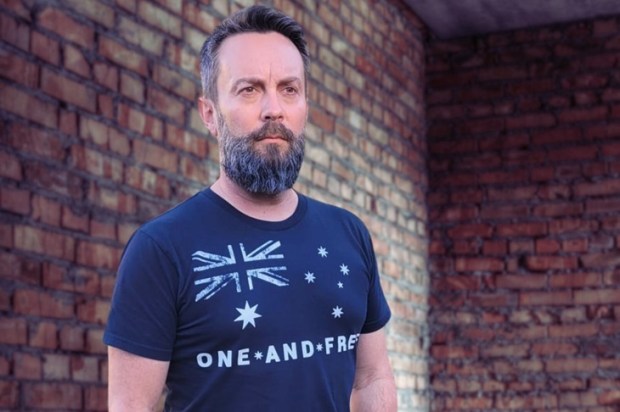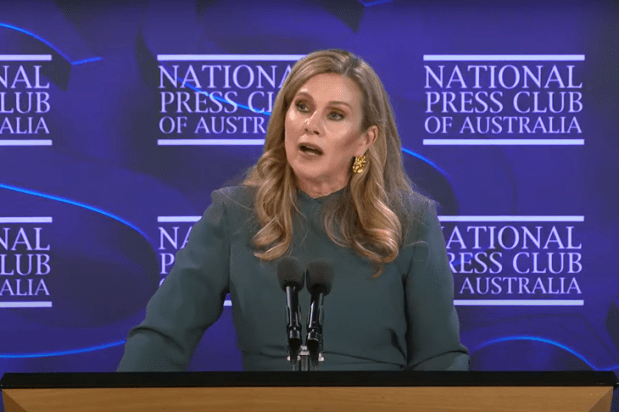Having sat on their hands while liberalism was annihilated in Australia, our corporate leaders are reportedly in shock at the news we have a Treasurer and Prime Minister determined to drive the greatest central control of our economy since the Whitlam era.
Spare me.
The same people who sat quietly in boardrooms and C-suites all across Sydney and Melbourne scoffing at people like Clive Palmer – who was actually investing considerable capital in a fight against left-wing forces – are now ‘concerned’ about the plans of a far-left Labor-Green-controlled government to drive a highly interventionist ‘Great Reset’ of our economy.
Australian Industry Group boss Innes Willox and Business Council of Australia head Jennifer Westacott told The Australian earlier this week that ‘the private sector would work with the government in good faith, but advised against undermining the market-based system’.
Ouch. Talk about hitting them hard with a wet feather. Imagine the impact such powerful rhetoric would have had on Mao or Stalin back in the day.
The only business people who will suffer are – as always – small business, tradies, and the self-employed. The segment that employs more than half the nation’s workers, pays most of the tax, and is by far the most productive.
Those who enjoy the comforts and hide in the cracks of incompetence and inefficiency that riddle large organisational structures, will remain untouched, whether they’re public servants or corporate bureaucrats. Not only won’t they feel any pain from the Albo-Chalmers’ socialist ego trip, they’ll benefit from it. Hence bullets made of cotton wool are being fired from the organisations that claim to speak for private enterprise.
Large business hates small business. Small business represents the people who were good enough at their jobs and confident enough to walk away from the ‘machine’ to make it on their own two feet. They provide services and products more efficiently and more cheaply and often with a much better attitude than big business could ever hope to. The only way big business can win is to tie them up in bureaucracy. Red and green tape that is designed to suffocate…
Big corporations, both global and domestic, love it when big government talks about regulation. They know that only they have the size and scale to absorb the ridiculous waste inherent in meeting all the increased administrative requirements and paperwork and approvals that big government regulation brings in the name of ‘fairness’ and ‘safety’. Admin is toxic to small business and owner-operators. Every minute stuck behind a computer doing admin is one less minute spent doing the job that adds real value. Since most of that stuff is done ‘after hours’ it’s time stolen from small business peoples’ family and social lives too. Often too big a price to pay for many.
Hooray! Big organisations win! But it’s a damaging and toxic victory for the nation.
Of the 2.6 million businesses in Australia, 98 per cent are small and medium enterprises, according to data from the Australian Banking Association. And micro-businesses were the largest proportion of all Australian business, with 1.55 million employing no staff. Almost a million more employ fewer than 20 people.
Throttle this group and you throttle the nation. You also throttle tax revenue, leaving nothing for the public sector fat cats and their putrid private sector enablers, to steal and waste.
Jim Chalmers’ 600-word manifesto (+5,400 words of insufferable undergraduate-level waffle) promises a ‘new sustainable finance architecture which will rate the climate impact of different investments’.
The 44-year-old boy from Logan, who holds a PhD in political science but has never run a business, is sure that where 20th century leftist leaders dramatically failed, he will succeed.
Jim Chalmers can ‘fix capitalism’, according to … Jim Chalmers.
Somebody forgot to tell Jim that capitalism works best when you don’t try to ‘fix’ it, but lightly regulate its excesses and then leave it alone. Benefits of the free market come from the ‘free’ bit. Leave the market to do its thing, and innovation will thrive, inefficient operators will fail and die out, those who add the most value will flourish, competition will drive profit margins and prices down, and everyone benefits. It’s inherently democratic – millions of people making millions of tiny decisions daily – leading almost always to the best outcomes.
Good government doesn’t seek to change that. Good government seeks only to lightly regulate where the market fails, which is usually where competition is lost to monopoly, or adverse consequences require some standards to be set and policed, to ensure a level playing field.
Good government is a referee, but Jim and his ilk want to play the game. And they want to play in every position on the field all at once, happy to sideline the Ronaldos and Maradonas while they do so. What could possibly go wrong?
A lot. Former government policy and economic analyst and business consultant, Dimitri Burshtein, says those that don’t fit the government model will find it much harder to gain capital.
In an opinion editorial in The Australian on Wednesday, Burshtein notes that Chalmers’ rationale for the failure of ‘neo-liberalism’ falsely relies on examples of failures that actually had much more to do with government intervention, than any kind of ‘neo-liberal’ approach.
‘Chalmers’ prescription for a values-based capitalism is not capitalism but a rhetorical recycling of prior failed economic policies,’ he writes. ‘Chalmers’s “new” model of capitalism with government-designed and chaperoned markets will lead to the same place – poverty and penury.’
Herald Sun Business Commentator Terry McCrann was less polite, telling Sky News Australia that Chalmers’ ‘new capitalism’ will make Australia the ‘Venezuela of the Southern Hemisphere’ and create ‘hell on earth’.
There will certainly be major negative impacts felt in the left’s two favourite areas: the industrial relations sphere and the social-engineering sphere.
With large corporations and big government working hand-in-hand with unions on setting employment conditions, the new IR landscape will be designed to favour big business and dis-empower smaller players. Industry-wide collective bargaining is a classic example of this.
Add to that the corporate world’s passion to assist big government’s social engineering in the direction of post-modern, identity politics ideology – the ‘Woke’ agenda, to use the popular slang term – and the world starts to look bleak for anyone with a classical liberal, libertarian, or conservative worldview. The government’s desire to help corporations regulate all aspects of our lives, through Environment, Social and Governance (ESG) and Diversity, Equity and Inclusion (DEI) initiatives, is strengthening, not weakening.
The individual continues to be stripped of rights and self-authority in our country, while the power of the ‘collective’ strengthens. Only, it’s not really a socially-beneficial collective of the masses, as well-meaning socialist kids imagine. It’s a tiny collective of elites empowered to run the show and keep themselves in charge.
Throughout history, this has never fared well for the people. It leads to authoritarianism and tyranny. More fascist than socialist. And it will certainly punish the rich, the successful value-adders in society, and ‘shrink the pie’ of wealth and tax revenue Aussies have to share. None of which makes the future of Medicare, the NDIS, and other social services look too bright.
One thing is for sure: small business needs to organise and find their voice, because the big business lobby groups have no regard for the sector. Problem is, who has time for political campaigns when they’re spending their days working like dogs adding real value to the nation, and their evenings doing their BAS statements, and paying the tax that funds the pet intellectual indulgences of the Jim Chalmers of the world?
Damian Coory holds an MBA from the AGSM, is a journalist, a consultant, and has held multi-country leadership positions in both large and small enterprises.

























